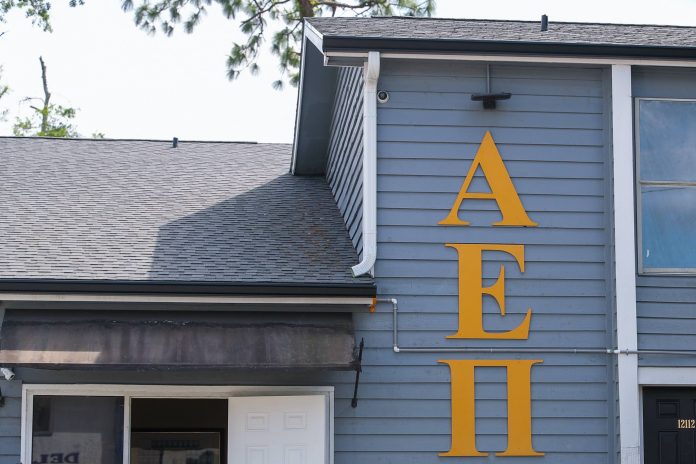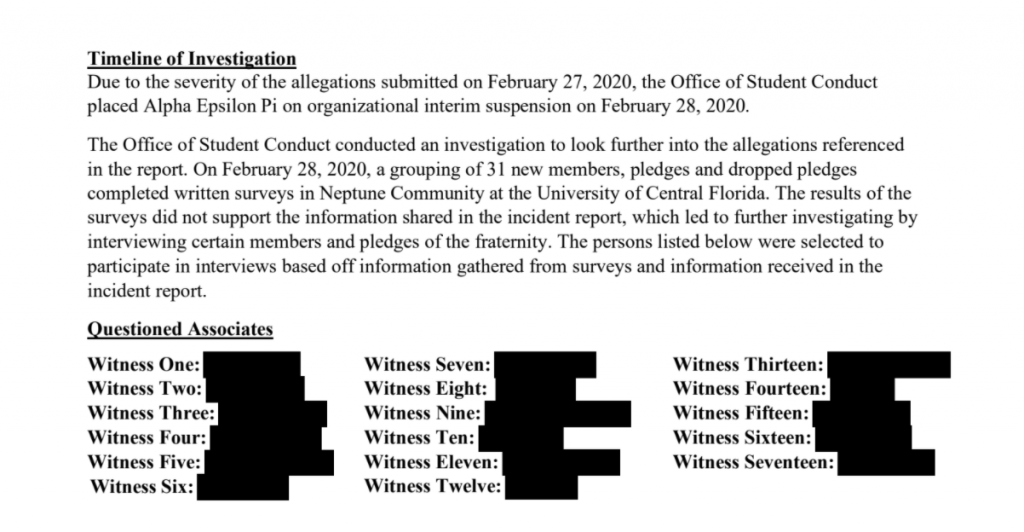
UCF’s Alpha Epsilon Pi fraternity withdrew its university affiliation — citing unjust student conduct processes — but said the fraternity will continue its mission with the support of its national organization, according to a letter the fraternity sent to the university on Thursday.
The fraternity is currently under interim suspension resulting from an anonymous incident report made in February, a UCF spokesperson said in a Thursday email. The report alleges multiple incidents of hazing, alcohol and drug use, threatening behavior and unsanctioned events.
Past International President of Alpha Epsilon Pi Jon Pierce said the organization lacks confidence in UCF’s ability to handle conduct cases like these.
“Alpha Epsilon Pi International is not confident in UCF’s student conduct program and in the administration’s handling of these types of cases. We strongly believe in using situations such as these as teaching moments, not just punitive opportunities,” Pierce said in a Thursday email. “We support our chapter and will work closely with them to ensure that they follow our health and safety guidelines and work to fulfill our mission of developing the future leaders of the world’s Jewish communities.”
The fraternity said in the letter sent to UCF that it looks forward to continuing its chapter off-campus with the support of its national organization.
“We simply do not feel that Greek organizations have been treated with fairness or justice in procedural hearings administered by the UCF Office of Student Conduct and therefore we have officially ended our affiliation with UCF,” Alpha Epsilon Pi’s letter reads.
In January, the Office of Student Conduct found UCF’s Sigma Chi fraternity in violation of disruptive conduct and alcohol-related misconduct and attempted to evict the fraternity from the house it privately owns on campus. Sigma Chi appealed on the grounds of the sanctions being extraordinarily dispropriate to the violations and won in March.
Here’s what we know:
The initial accusation was made on Feb. 27, and Knight News requested the incident report on March 3 — just five days after it was reported to UCF.
Records were not provided to Knight News until the fraternity announced it was cutting ties with the university — Knight News obtained the investigative summary on Thursday.
In Alpha Epsilon Pi’s investigative summary — written by Office of Student Conduct Assistant Director Xavier Shannon — and the letter the fraternity sent to the university, were the only records produced Thursday.

The investigative summary states photos, videos, and a timeline of events were included in the incident report submitted to the university in February.
It is not immediately known if the Office of Student Conduct has contacted, or plans to contact, the individual who initially reported the allegations to the university. The anonymous individual wrote in the initial report that he is a member of the fraternity and is keeping his identity hidden for his personal safety.
“Some of the activities that pledges were force to do during their new member education process was: drink bong water, drink multiple shots of vinegar, forcefully down random amounts of certain food, be physical assaulted by brothers, forcefully make pledges consume alcohol, blind food pledges and throw a variety of substances and food on them for hours, and make pledges carry binders full of porn to and from meetings,” the reporter wrote.
Thirty-one written surveys were initially completed by new members of the organization to start the investigation into the allegation against the fraternity, the document states.

“The results of the surveys did not support the information shared in the incident report, which led to further investigating by interviewing certain members and pledges of the fraternity,” Shannon wrote in the report.
The investigative summary — written by Shannon in preparation for Office of Student Conduct Director Michael Gilmer — documents the interviews Shannon conducted with 17 individuals from the fraternity. Shannon — UCF’s main investigator for organizational conduct cases — said in the conclusion investigative summary that the case should move forward to the formal review process based on the information gathered.
He cites a preponderance of evidence that a hazing event occurred, but lists over 20 charges for the fraternity to face and defend themselves against in a formal hearing in June.
The preponderance of evidence standard is the method student conduct uses in investigations and formal hearings. It is based on the “more likely than not” threshold that a fact or violation of the rules of conduct did occur, according to the Golden Rule Student Handbook.
The Foundation for Individual Rights in Education — a nonprofit organization dedicated to defending and sustaining the rights of individuals on college campuses across the country — urges universities to uphold its promise of due process to student groups.
Zach Greenberg, an attorney with FIRE’s Individual Rights Defense Program, said he doesn’t have all the details to comment on this conduct case, but said FIRE has helped cases involving student organizations and due process violations nationwide.
“We see many student groups of all political persuasions, viewpoints, shapes and sizes — including fraternities and sororities, and other Greek organizations — get charged under their student conduct codes and many times they are punished without having an opportunity to be heard and without having a hearing or any semblance of due process,” Greenberg said.
Greenberg said notice of charges and opportunity to be heard by an impartial advisor, or panel, are just a few components of basic fundamental procedures — the due process and rights for organizations that UCF recognizes can be found in the Golden Rule Student Handbook.
“It’s the general fundamental fairness principle that these student groups are presumed innocent until proven guilty and they must be given a chance to defend themselves before being punished by the school,” Greenberg said. “We urge universities to do right by these groups and uphold the process by affording these groups the fundamental fairness procedures.”
A UCF spokesperson said while the Greek system benefits many students, the community cannot tolerate allegations of misconduct or actions that endanger our campus community.
This is a developing story.
Check back with Knight News for updates.
Continue reading for the investigative summary.



